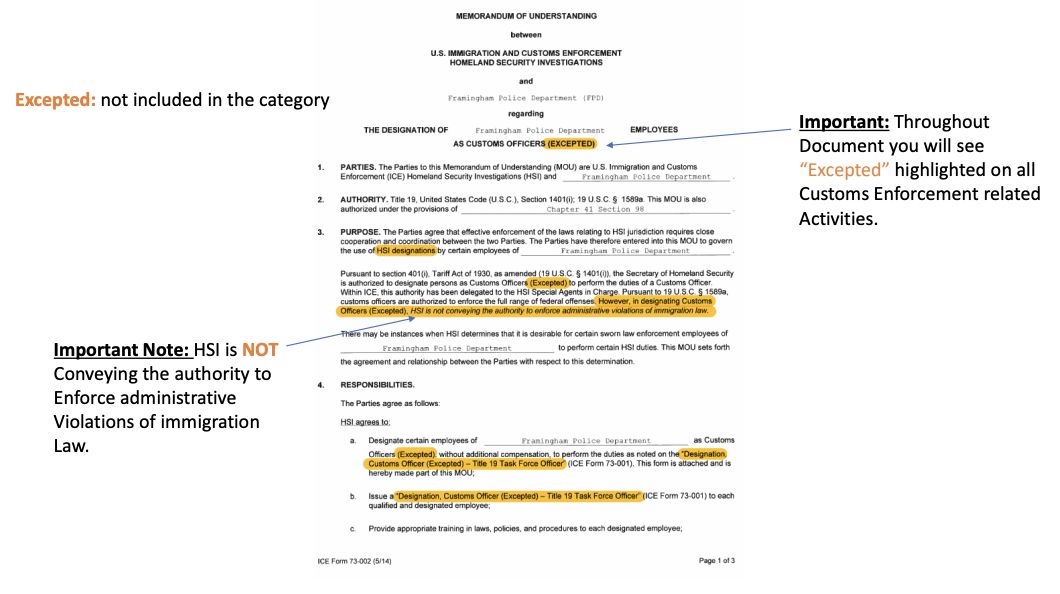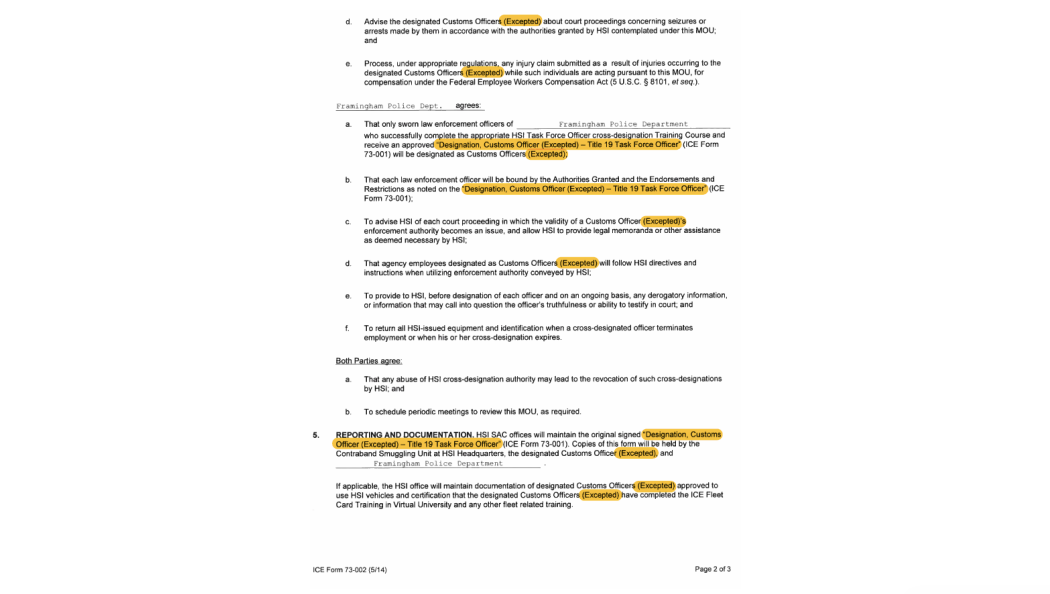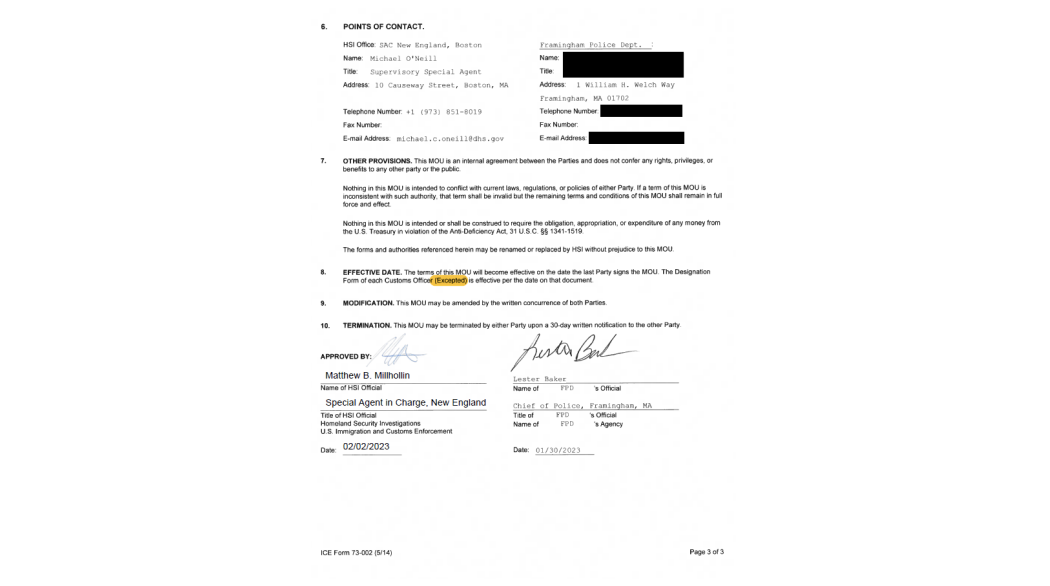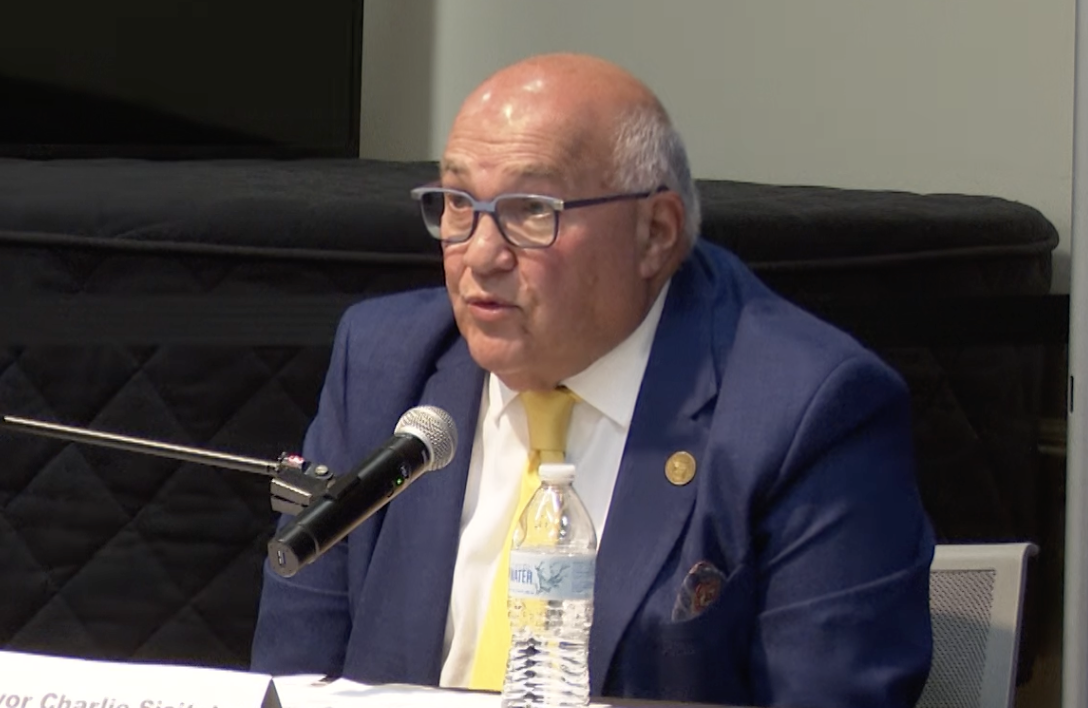Amid continued nationwide immigration operations by federal agencies, Deputy Chief Sean Riley spoke to the City Council to provide details on the department’s memorandum of understanding with the U.S. Department of Homeland Security.
FRAMINGHAM - Framingham Deputy Police Chief Sean Riley spoke to the City Council regarding U.S. Immigration and Customs Enforcement (ICE) operations, as he aimed to clarify the local police department’s partnerships with federal agencies during the local legislative group’s meeting on Tuesday, November 18.
In early 2023, the Framingham Police Department (FPD) signed a memorandum of understanding (MOU) with the U.S. Department of Homeland Security’s ICE and Homeland Security Investigations (HSI) branches. It’s one of the multiple agreements it has with various federal departments, such as the FBI and the DEA. Riley explained during his presentation to the City Council that those partnerships are meant to bolster resources to pursue criminal cases related to things like drugs, firearms, terrorism, human trafficking, fraud, child exploitation, and cybercrime.



The memorandum shows that Homeland Security branches are not conveying the authority for Framingham police officers to “enforce administrative violations of immigration law.”
“Even if that said they were going to give us permission, Commonwealth v. Lunn takes that away from us, so we can’t do it…(Federal agencies don’t) want us involved, because they know we can’t be involved,” Riley said at the Memorial Building on Tuesday.
The case Riley referred to is 2017’s Lunn v. Commonwealth within the Massachusetts Supreme Judicial Court. By the ruling, state law enforcement groups are not given the authority to hold an individual in custody beyond their lawful release time based solely on their federal civil immigration detainer, as ICE civil detainers are not judicial warrants. Riley explained FPD must also abide by bail laws; if someone meets bail, the local police department cannot keep them in custody based solely on their ICE detainer. However, ICE can then apprehend that person if they have a civil immigration detainer.
Lunn v. Commonwealth also ruled local police officers cannot obstruct or interfere with ICE’s operations; Riley described the dynamic as, “they do their job, we do ours,” adding that FPD typically does not get advanced notification about ICE’s upcoming operations within the city.
FPD’s policy is that their officers do not directly participate in ICE operations if they are solely related to federal immigration laws and their civil—as opposed to criminal—enforcement. The policy dictates that the local police department’s mission is not to enforce federal immigration statutes. The only exceptions to that policy are when an individual is also wanted on a criminal warrant or for “immediate emergency assistance on a temporary basis for officer safety purposes.” Riley explained the latter situation could include an instance where an ICE officer’s vehicle could be stolen; local police officers could watch over the federal officer’s vehicle in that situation.
The FPD automatically shares the fingerprints of anyone arrested locally with the Department of Homeland Security and other federal agencies, according to Riley.
District 2 City Council member Brandon Ward said this topic was added to the board’s agenda to clarify FPD’s operations in relation to the Homeland Security MOU as well as to ensure that proper laws and protocols are being follows with regards to people being questioned by local police officers about their immigration status. Riley said those steps are being followed, adding that immigration information is irrelevant to the city’s law enforcement efforts.
“We do have access to a lot of information as law enforcement, we do. That’s a great responsibility that we do have,” Riley continued.
“But we need to use it correctly, and asking for immigration status does not matter to us. And it specifically states in the Lund decision, in policy, that you can’t ask unless it’s very specifically related to very specific crimes—and there’s a handful of those.”
District 9 City Councilor Tracey Bryant asked Riley if there was any recourse for people in Framingham to try and take legal action against federal immigration enforcement agencies if they feel they were wrongly detained or targeted. Riley said those individuals would have to go directly to those federal agencies since the local police department is not involved.
“That shows a flaw right there,” Bryant responded, “because that’s like asking a rape victim to go to the rapist to get justice.”
“Here’s the conundrum: you don’t want us to get involved with ICE, but now you’re asking us to get involved with ICE...You can’t come to us, because we have zero authority over (ICE),” Riley responded.
City Solicitor Kathryn Fallon Manupelli pointed to various community organizations that attempt to help those within the immigrant community, as she recommended to anyone looking for legal courses of action to speak with a lawyer.
District 7 City Council member Leora Mallach pointed to a previous memorandum signed between FPD and ICE back in 2007; she wanted to know if there was another memorandum that cancelled that 2007 agreement out or if it had just expired. Riley said he and his colleagues would look into the 2007 memorandum.
District 3 City Councilor Adam Steiner and At-Large City Council member George King inquired as to why this specific MOU with Homeland Security exists in the first place. King specifically pointed to the number of “excepted” inclusions in the MOU provided within Riley’s presentation.
“If you take that word out, if you assume are all exemptions that don’t apply to us, it makes no sense to have the MOU,” King continued.
Riley, once more, said he would work with the police department to get clarification on that matter.
Public comments following Riley’s presentation on Tuesday widely called for increased transparency about immigration enforcement operations as well as about what information is shared with federal agencies by FPD and how. Residents called upon local leaders to be mindful of optics; Riley reiterated that he’s looking to build trust in the department within the community.
Local resident and member of the Framingham Democratic Committee Rosamond Hooper-Hamersley urged municipal officials—especially the City Council and Mayor Charlie Sisitsky—to “stand up for immigrants” within the city, as District 8 City Council member Leslie White Harvey noted that she consistently hears fear from constituents given the current situation regarding ICE’s presence across the United States.
“We have this concrete opportunity to demonstrate compassionate leadership,” Hooper-Hamersley said.
“We have ways to foster fundamental and just change in a world that is aching for it.”
Ahead of Tuesday’s meeting, Ward submitted the “Framingham Trust in Local Law Enforcement Ordinance” for review. Riley said the ordinance, by and large, looks to be in line with what the law already dictates and what the police department is already doing on this front. Ward hopes that the ordinance can help “codify” those actions, as the draft also proposes an annual review breaking down figures such as how many civil immigration detainer requests are logged with Framingham’s law enforcement officials each year along with the total number of individuals transferred in Framingham to ICE’s custody. The ordinance will be referred to the City Council’s Rules, Ordinances and Ethics Subcommittee.

About 23% of registered Framingham voters cast a ballot in 2025. Charlie Sisitsky defeated Geoff Epstein to win another term as mayor, while John Stefanini and Mary Kate Feeney won in their respective City Council races. Brandon Ward and Michael Cannon were reelected to the local legislative board, while Lorena Tovar and Brent Lewis were victorious in their School Committee bids. Changes to the city's Home Rule Charter received overwhelming support as well.